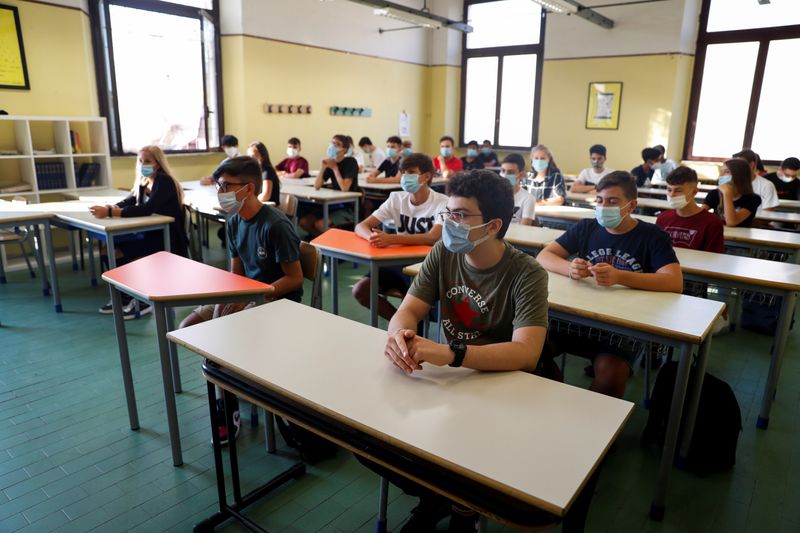By Crispian Balmer and Antonio Denti
ROME (Reuters) - After a six-month shutdown, the longest in Europe, Italy reopened most of its schools on Monday, testing the organisational skills of the government, the nerves of teachers and the self-control of excited students.
Schools in 13 of the country's 20 regions cautiously resumed face-to-face lessons, calling back 5.6 million students to their desks. The remaining seven regions have decided to delay for another week.
"There is a huge sense of excitement both on the part of us teachers and the children. We are very happy to see each other again, but it is also a struggle not to get too close," said Patrizia Zucchetta, a primary school teacher in Rome.
Battling to halt the spread of coronavirus, the government shut the nation's schools in early March. Efforts to make classrooms safe again and limit the possibility of fresh contagion have been mired in controversy.
"At the beginning there are going to be problems," Prime Minister Giuseppe Conte acknowledged on Sunday.
Many of the new 2.4 million single desks needed to guarantee social distancing, have failed to arrive in time, unions say, while thousands of teaching positions remain vacant and older staffers have expressed concerns about the risks they face.
The Organisation for Economic Cooperation and Development (OECD) says 59% of all Italy's primary and secondary school teachers are aged over 50 - the highest in the Western world - making the education system vulnerable to infections.
In Italy, about 35,500 people have died of COVID-19, the largest death toll in the European Union, and the number of new cases has picked up recently raising fears of a second wave.
"We are following the security protocols, but there is fear and above all uncertainty about how the year will proceed. Many teachers are very anxious," said Alessandro Capata, deputy-head of Rome's Avogadro secondary school.
Parents also expressed doubts about the coming months. Schools say children with the slightest symptoms of a cold or fever must stay home. Pupils aged six and above have to wear masks outside their classrooms and should avoid physical contact.
"I have explained to the children to avoid contact, kisses and hugs, but I don't want them to live in terror because I don't think they need to," said Claudia Costantini, the mother of two primary school children.

"You have to make them understand things will get better."